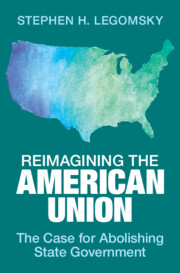Refine search
Actions for selected content:
8 results
10 - How Do We Confront Ableism?
- from Part IV - Time to Act!
-
- Book:
- Justice, Equity, Diversity, and Inclusion in the United States
- Published online:
- 19 November 2025
- Print publication:
- 30 October 2025, pp 227-251
-
- Chapter
-
- You have access
- Open access
- HTML
- Export citation
3 - Democracy
-
- Book:
- Reimagining the American Union
- Published online:
- 02 January 2025
- Print publication:
- 09 January 2025, pp 94-183
-
- Chapter
- Export citation

Reimagining the American Union
- The Case for Abolishing State Government
-
- Published online:
- 02 January 2025
- Print publication:
- 09 January 2025
2 - America
-
- Book:
- Political Technology
- Published online:
- 30 November 2023
- Print publication:
- 14 December 2023, pp 107-169
-
- Chapter
- Export citation
Epilogue - “Send Her Back”
-
- Book:
- Neighborhood Watch
- Published online:
- 26 May 2022
- Print publication:
- 09 June 2022, pp 181-193
-
- Chapter
- Export citation
14 - Elections, Polarization, and Democratic Resilience
- from Part V - Can Political Action Save Democracy in Polarized Times?
-
-
- Book:
- Democratic Resilience
- Published online:
- 20 November 2021
- Print publication:
- 25 November 2021, pp 343-368
-
- Chapter
- Export citation
12 - Laboratories of What?
- from Part IV - Vicious Circles? The Relationship between Polarized Behavior and Institutions
-
-
- Book:
- Democratic Resilience
- Published online:
- 20 November 2021
- Print publication:
- 25 November 2021, pp 297-319
-
- Chapter
- Export citation
6 - The Policy and Social Consequences of State Legislative Gerrymandering
-
- Book:
- Gerrymandering the States
- Published online:
- 02 July 2021
- Print publication:
- 22 July 2021, pp 117-134
-
- Chapter
- Export citation
